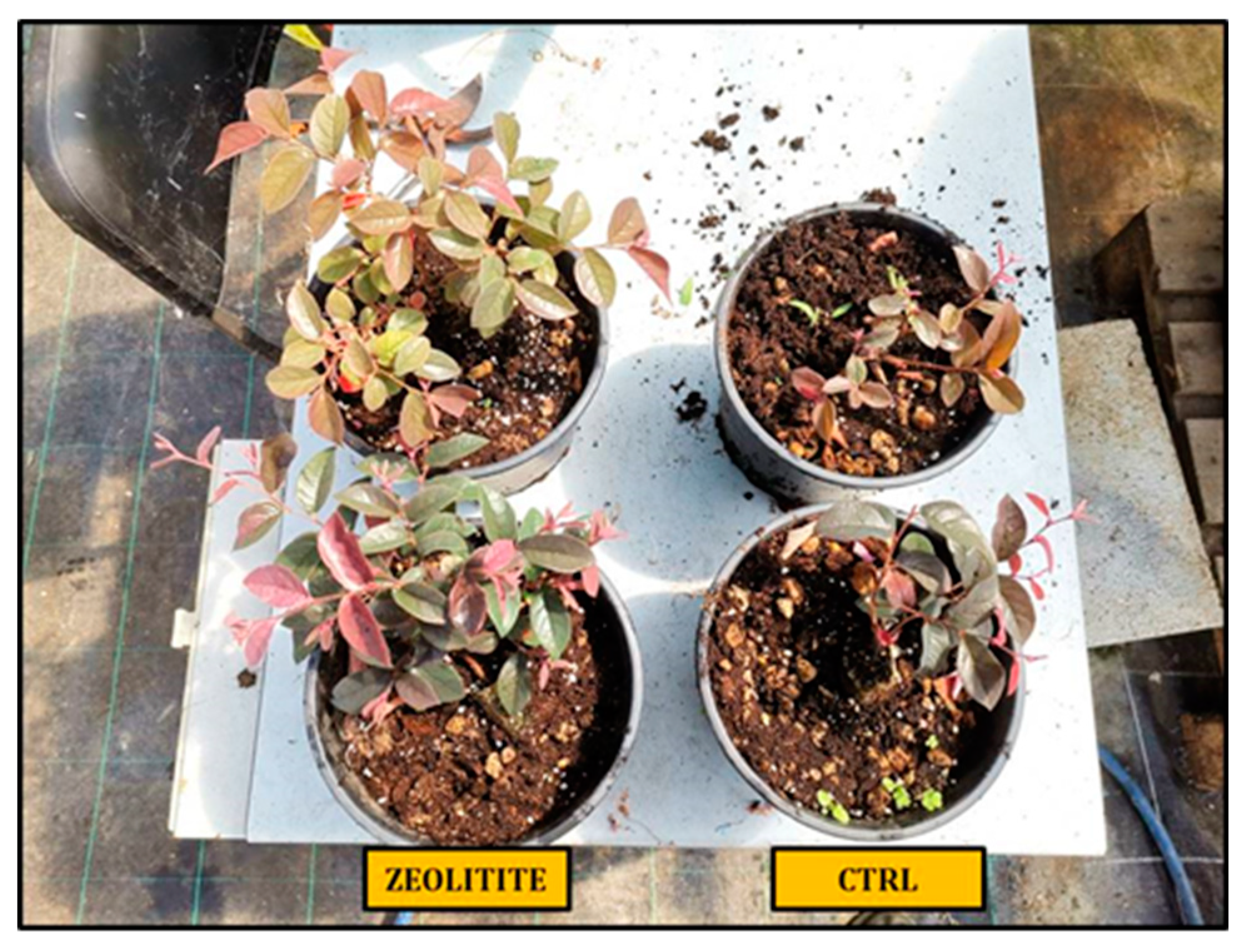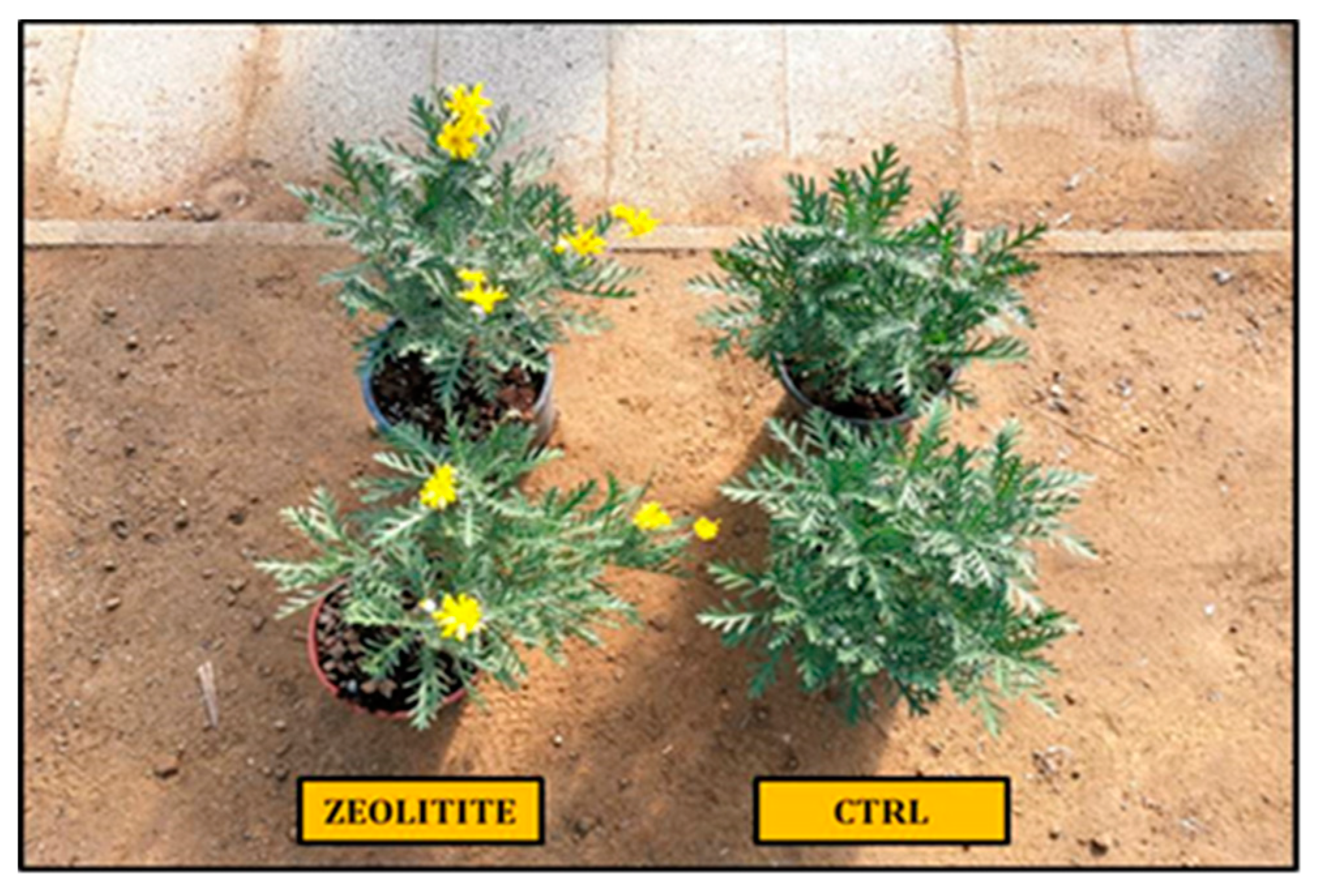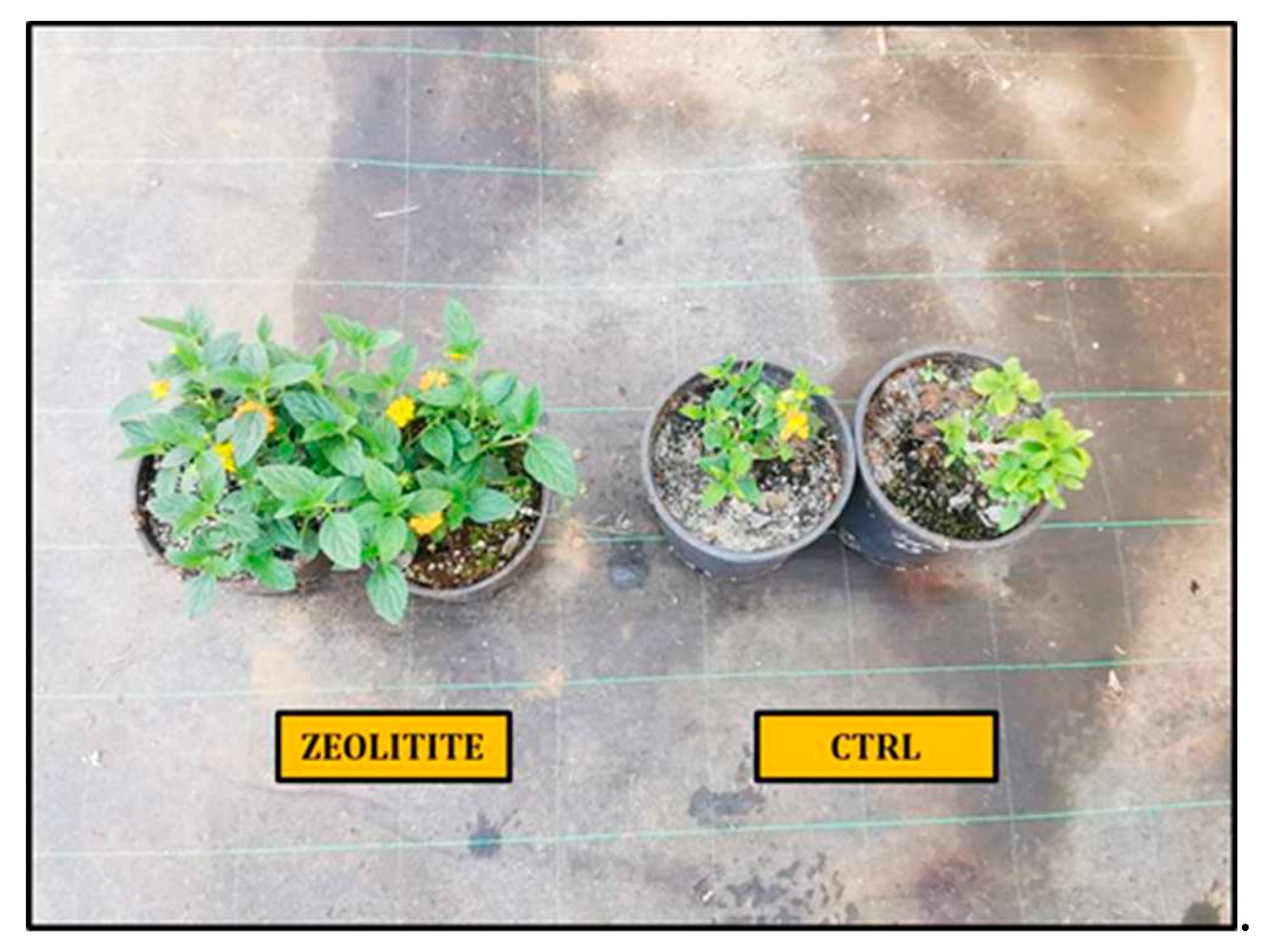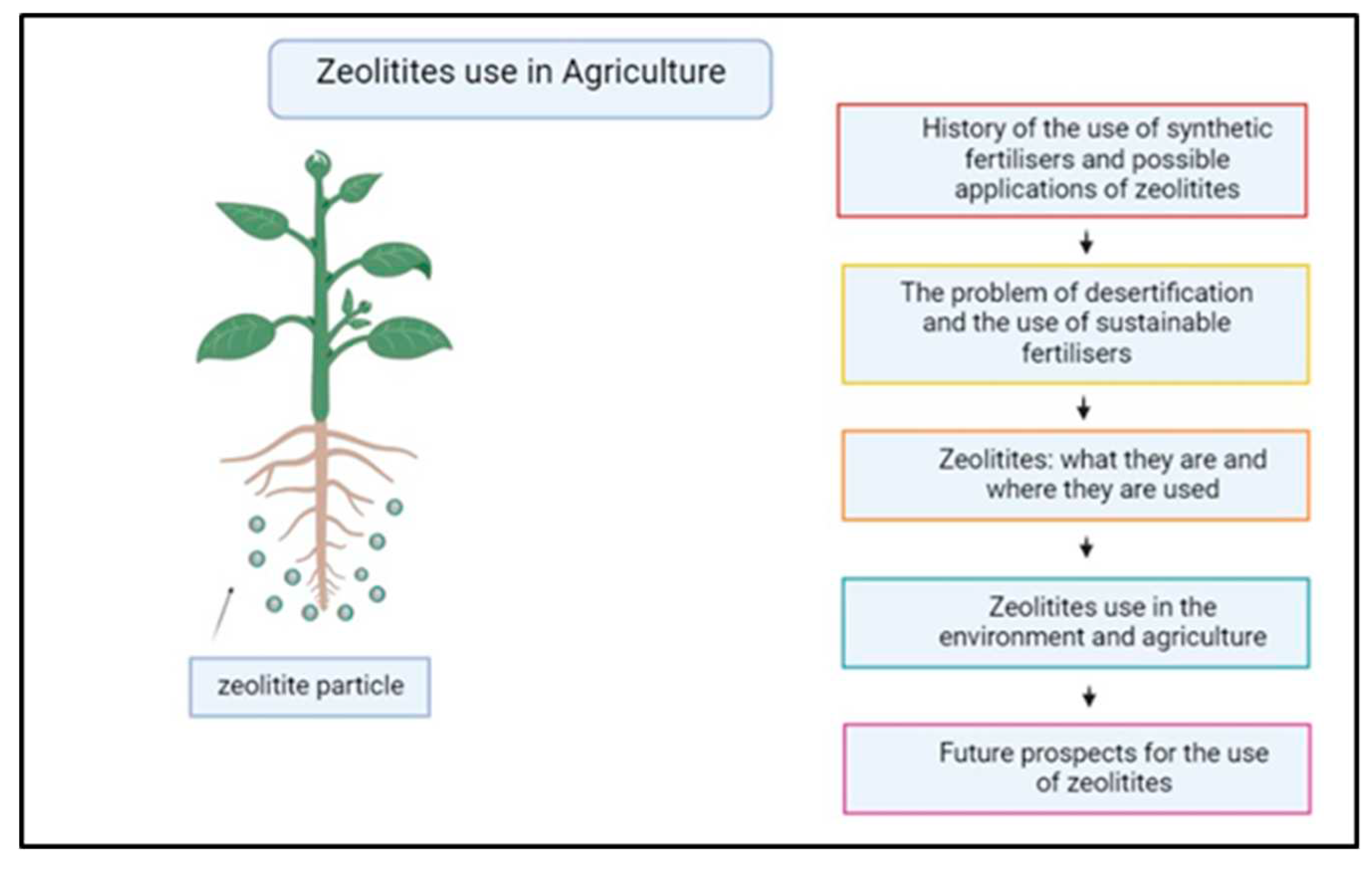Submitted:
27 July 2023
Posted:
28 July 2023
You are already at the latest version
Abstract
Keywords:
1. Introduction
2. Soil desertification and sustainable use of fertilizers
3. Zeolitites
4. Utilisation of zeolitites
5. Zeolitites in the environment and in agriculture



6. Future perspectives on the use of zeolitites
6. Conclusions
Author Contributions
Funding
Informed Consent Statement
Data Availability Statement
Acknowledgments
Conflicts of Interest
References
- Aainaa, H.N.; Haruna Ahmed, O.; Ab Majid, N.M.; Reinhart, K.O. Effects of clinoptilolite zeolite on phosphorus dynamics and yield of Zea mays L. cultivated on an acid soil. PLoS ONE. 2018, 13, e0204401. [Google Scholar]
- Al-Busaidi, A.; Yamamoto, T.; Inoue, M.; Eneji, A.E.; Mori, Y.; Irshad, M. Effects of zeolite on soil nutrients and growth of barley following irrigation with saline water. J. Plant Nutr. 2008, 31, 1159–1173. [Google Scholar] [CrossRef]
- Kotoulas, A.; Agathou, D.; Triantaphyllidou, I.; Tatoulis, T.; Akratos, C.; Tekerlekopoulou, A.; Vayenas, D. Zeolite as a potential medium for ammonium recovery and second cheese whey treatment. Water (Switzerland). 2019, 11, 136. [Google Scholar] [CrossRef]
- Alimi, T.; Ajewole, O.C.; Olubode-Awosola, O.O.; Idowu, E.O. Organic and inorganic fertilizer for vegetable production under tropical conditions. J Agric Rural Dev. 2007, 1, 120–136. [Google Scholar]
- Allen, E.R.; Ming, D.W. Recent progress in the use of natural zeolites in agronomy and horticulture. In Natural Zeolites (1993). Eds DW Ming and FA Mumpton. 1995; pp. 477–490.
- Andronikashvili, T.G.; Kadava, M.A.; Gamisonia, M.K. Effect of natural zeolites on microbe landscape of some soils in Georgia. Abstracts, Sofia International Zeolite Meeting. 1995; pp. 111–112.
- Andrzejewska, A.; Diatta, J.; Spizewski, T.; Krzesinski, W.; Smurzynska, A. Application of zeolite and bentonite for stabilizing lead in a contaminated soil. Inzynieria ˙ Ekol. 2017, 18, 1–6. [Google Scholar] [CrossRef]
- Hermassi, M.; Valderrama, C.; Font, O.; Moreno, N.; Querol, X.; Batis, N.H.; Cortina, J.L. Phosphate recovery from aqueous solution by K-zeolite synthesized from fly ash for subsequent valorisation as slow release fertilizer. Sci. Total Environ. 2020, 731, 139002. [Google Scholar] [CrossRef]
- Martínez, T.L.M.; Ivanova, S.; Louis, B.; Odriozola, J.A. Synthesis and Identification Methods for Zeolites and MOFs. Zeolites Met. Fram. 2019; pp. 25–52.
- Bandura, L.; Franus, M.; Panek, F.; Woszuk, A.; Franus, W. Characterization of zeolites and their use as adsorbents of petroleum substances. Przem. Chem. 2015, 94, 323–327. [Google Scholar]
- Bandura, L.; Panek, R.; Madej, J.; Franus, W. Synthesis of zeolite-carbon composites using high-carbon fly ash and their adsorption abilities towards petroleum substances. – Fuel. 2021, 283, 119173. [Google Scholar] [CrossRef]
- Wang, B.; Chu, C.; Wei, H.; Zhang, L.; Ahmad, Z.; Wu, S.; Xie, B. Ameliorative effects of silicon fertilizer on soil bacterial community and pakchoi (Brassica chinensis L. ) grown on soil contaminated with multiple heavy metals. Environ. Pollut. 2020, 267, 115411. [Google Scholar]
- Belviso, C. Zeolite for potential toxic metal uptake from contaminated soil: A brief review. Processes. 2020, 8, 820. [Google Scholar] [CrossRef]
- Cataldo, E.C.; Salvi, L.S.; Paoli, F.P.; Fucile, M.F.; Masciandaro, G.M.; Manzi, D.M.; Masini, C.M.M.; Mattii, G.B.M. Application of zeolites in agriculture and other potential uses: A review. Agronomy. 2021, 11, 1–14. [Google Scholar] [CrossRef]
- Baghbani-Arani, A.; Jami, M.G.; Namdari, A.; Karami Borz-Abad, R. Influence of irrigation regimes, zeolite, inorganic and organic manures on water use efficiency, soil fertility and yield of sunflower in a sandy soil. Commun. Soil Sci. Plant Anal., 2020, 51, 711–725. [Google Scholar] [CrossRef]
- Czarna-Juszkiewicz, D.; Kunecki, P.; Panek, R.; Madej, J.; Wdowin, M. Impact of fly ash fractionation on the zeolitization process. Materials (Basel). 2020, 13, 1–13. [Google Scholar] [CrossRef] [PubMed]
- Eslami, M.; Khorassani, R.; Fotovat, A.; Halajnia, A. NH4+-K+ co-loaded clinoptilolite as a binary fertilizer. Arch. Agron. Soil Sci. 2020, 66, 33–45. [Google Scholar] [CrossRef]
- Bikkinina, L.H.; Ezhkov, V.O.; Faizrakhmanov, R.N.; Gazizov, R.R.; Ezhkova, A.M.; Fayzrakhmanov, D.; Ziganshin, B.; Nezhmetdinova, F.; Shaydullin, R. Effect of zeolites on soil modification and productivity. BIO Web Conf. 2020, 17, 00117. [Google Scholar] [CrossRef]
- Cadar, O.; Dinca, Z.; Senila, M.; Torok, A.I.; Todor, F.; Levei, E.A. Immobilization of potentially toxic elements in contaminated soils using thermally treated natural zeolite. - Materials (Basel). 2021, 14, 3777. [Google Scholar] [CrossRef]
- Czuma, N.; Baran, P.; Franus, W.; Zabierowski, P.; Zarębska, K. Synthesis of zeolites from fly ash with the use of modified two-step hydrothermal method and preliminary SO2 sorption tests. Adsorpt. Sci. Technol. 2019, 37, 61–76. [Google Scholar] [CrossRef]
- Cie´sla, J.; Kedziora, K.; Gluszczyk, J.; Szerement, J.; Jozefaciuk, G.; Franus, W.; Franus, M. Environmental-friendly modifications of zeolite to increase its sorption and anion exchange properties. Physicochemical studies of the modified materials. 2019, 10, 112–126. [Google Scholar]
- Collins, F.; Rozhkovskaya, A.; Outram, J.G.; Millar, G.J. A critical review of waste resources, synthesis, and applications for Zeolite LTA. Microporous Mesoporous. Mater. 2020, 291, 109667. [Google Scholar] [CrossRef]
- Foley, J.A. Si può nutrire il mondo e proteggere il pianeta? Le Scienze. 2021; pp. 512.
- De Smedt, C.; Someus, E.; Spanoghe, P. Potential and actual uses of zeolites in crop protection. Pest Manag. Sci. 2015, 71, 1355–1367. [Google Scholar] [CrossRef]
- De Smedt, C.; Steppe, K.; Spanoghe, P. Beneficial effects of zeolites on plant photosynthesis. Adv. Mater. Sci. 2017, 2, 1–11. [Google Scholar] [CrossRef]
- Eroglu, N.; Emekci, M.; Athanassiou, C.G. Applications of natural zeolites on agriculture and food production. J. Sci. Food Agric. 2017, 97, 3487–3499. [Google Scholar] [CrossRef] [PubMed]
- Ippolito, J.A.; Tarkalso, D.D.; Lehrsch, G.A. Zeolite soil application method affects inorganic nitrogen, moisture, and corn growth. Soil Science. 2011, 176, 136–142. [Google Scholar] [CrossRef]
- Ming, D.W.; Mumpton, F.A. Zeolites in soils. - Miner. Soil Environ. 1989; pp. 873–911.
- Prisa, D. Italian chabazitic-zeolitite and Effective microorganisms for the qualitative improvement of olive trees. Soc. Tosc. Sci. Nat., Mem. 2018, 125, 13–17. [Google Scholar]
- Filcheva, E.G.; Tsadilas, C.D. Influence of clinoptilolite and compost on soil properties. Commun. Soil Sci. Plant Anal. 2002, 33, 595–607. [Google Scholar] [CrossRef]
- Passaglia, E. Zeolititi in agricoltura. Mitigazione delle problematiche ambientali conseguenti pratiche agricole e alla gestione dei reflui zootecnici. - Informatore agrario. 2019; pp. 125.
- Prisa, D. Effective Microorganisms And Chabazitic-Zeolites For The Improvement Quality Of Echinopsis Hybrids. Asian Academic Research Journal of Multidisciplinary. 2019, 6(2), 23–34. [Google Scholar]
- Ramesh, K.; Reddy, D.D. Zeolites and Their Potential Uses in Agriculture. Elsevier. 2011; pp. 219–241.
- Prisa, D. Germination Of Vegetable And Grassland species With Micronized chabazitic-Zeolites And Endophytic Fungi. IOSR Journal of Agriculture and Veterinary Science. 2019, 12, 32–37. [Google Scholar]
- Georgiev, D.; Zagora, S. Synthetic zeolites - structure, classification, current trends in zeolite synthesis: review. Proceedingas of the International Science conference. 2009; pp. 1–6.
- Mahmoud, A.W.M.; Swaefy, H.M. Comparison between commercial and nano NPK in presence of nano zeolite on sage plant yield and its components under water stress. Agriculture. 2020, 66, 24–39. [Google Scholar] [CrossRef]
- Prisa, D.; Burchi, G.; Antonetti, M.; Teani, A. Use Of organic or inorganic substrates for reducing the use of peat and improving the quality of bulbs and inflorescences in Asiatic Lily. Acta Horticulturae. 2011, 900, 143–148. [Google Scholar] [CrossRef]
- Manjaiah, K.M.; Mukhopadhyay, R.; Paul, R.; Datta, S.C.; Kumararaja, P.; Sarkar, B. Clay minerals and zeolites for environmentally sustainable agriculture. In: Modified Clay and Zeolite Nanocomposite. Materials. 2019; pp. 309–329.
- Yuvaraj, M.; Subramanian, K.S. Development of slow release Zn fertilizer using nano-zeolite as carrier. J. Plant Nutr. 2018, 41(3), 311–320. [Google Scholar] [CrossRef]
- Ghadamnan, E.; Nabavi, S.R.; Abbas, M. Nano LTA zeolite in water softening process: synthesis, characterization, kinetic studies and process optimization by response surface methodology (RSM). Journal of Water Environment and Nanotechnology. 2019, 4, 119–128. [Google Scholar]
- Gholamhoseini, M.; Ghalavand, A.; Khodaei-Joghan, A.; Dolatabadian, A.; Zakikhani, H.; Farmanbar, E. Zeolite-amended cattle manure effects on sunflower yield, seed quality, water use efficiency and nutrient leaching. - Soil Tillage Res. 2013, 126, 193–202. [Google Scholar] [CrossRef]
- Hall, A. Zeolitisation of volcaniclastic sediments: The role of temperature & pH. - J. Sed. Res. 1998, 68, 739–745. [Google Scholar]
- Jacobs, P.A.; Flanigen, E.M.; Jansen, J.C.; Van Bekkum, H. Introduction to Zeolite - Science and Practice. 2001; pp. 11–35.
- Jha, V.K.; Hayashi, S. Modification on natural clinoptilolite zeolite for its NH4+ retention capacity. J. Hazard. Mater. 2009, 169, 29–35. [Google Scholar] [CrossRef]
- Mihok, F.; Macko, J.; Orinak, A.; Orinakov, R.; Kova, K.; Sisakov, K.; Petru, O.; Kosteck, Z. Controlled nitrogen release fertilizer based on zeolite clinoptilolite: Study of preparation process and release properties using molecular dynamics. - Curr. Res. Green Sustain. Chem. 2020, 3, 100030. [Google Scholar] [CrossRef]
- Prisa, D. Particle films: chabazitic zeolites with added microorganisms in the protection and growth of tomato plants (Lycopersicon esculentum L.). GSC Advanced Research and Reviews. 2020, 4(2), 01–08.
- Prisa, D. Chabatitic Zeolites With Earthworm Humus Added To The Growing Media To Improve Germination and Growth of Horticultural Plants. International Journal of Scientific Research in Multidisciplinary Studies. 2020, 6(5), 24–31. [Google Scholar]
- Kalita, B.; Bora, S.S.; Gogoi, B. Zeolite: a soil conditioner. Int. J. Curr. Microbiol. Appl. Sci. 2020, 9, 1184–1206. [Google Scholar] [CrossRef]
- Prisa, D. Comparison between sterilized zeolite and natural zeolite in the Cactus Pear (Opuntia Ficus-Indica L. Mill.) growing. GSC Advanced Research and Reviews. 2020, 04(03), 007–014.
- Barbarick, K.A.; Lai, T.M.; Eberl, D.D. Exchange Fertilizer (Phosphate Rock plus Ammonium-Zeolite) Effects on SorghumSudangrass. Soil Sci. Soc. Am. J. 1990, 54, 911–916. [Google Scholar] [CrossRef]
- Mohammad, M.J.; Karam, N.S.; Al-Lataifeh, N.K. Response of croton grown in a zeolite-containing substrate to different concentrations of fertilizer solution. Commun. Soil Sci. Plant Anal. 2005, 35, 2283–2297. [Google Scholar] [CrossRef]
- Kavoosi, M. Effects of zeolite application on rice yield, nitrogen recovery, and nitrogen use efficiency. Commun. Soil Sci. Plant Anal. 2007, 38, 69–76. [Google Scholar] [CrossRef]
- Ahmed, O.H.; Sumalatha, G.; Muhamad, A.N. Use of zeolite in maize (Zea mays) cultivation on nitrogen, potassium and phosphorus uptake and use efficiency. Int. J. Phys. Sci. 2010, 5, 2393–2401. [Google Scholar]
- Kralova, M.; Hrozinkova, A.; Ruzek, P.; Kovanda, F.; Kolousek, D. Synthetic and Natural Zeolites Affecting the Physicochemical Soil Properties. Rostlinna Vyroba-UZPI: Praha, Czech Republic. 1994; pp. 126–195.
- Desutter, T.M.; Pierzynski, G.M. Evaluation of soils for use as liner materials: A soil chemistry approach. J. Environ.. 2005, 34, 951–962. [Google Scholar] [CrossRef] [PubMed]
- Doni, S.; Gispert, M.; Peruzzi, E.; Macci, C.; Mattii, G.B.; Manzi, D.; Masini, C.M.; Grazia, M. Impact of natural zeolite on chemical and biochemical properties of vineyard soils. Soil Use Manag. 2020; pp. 1–11.
- De Campos Bernardi, A.C.; Oliviera, P.P.A.; De Melo Monte, M.B.; Souza-Barros, F. Brazilian sedimentary zeolite use in agriculture. Microporous Mesoporous Mater. 2013, 167, 16–21. [Google Scholar] [CrossRef]
- Mazur, G.A.; Medvid, G.K.; Grigora, T.I. Use of natural zeolites for increasing the fertility of light textured soils. Pochvovedenie. 1984, 10, 70–77. [Google Scholar]
- Bouzo, L.; Lopez, M.; Villegas, R.; Garcia, E.; Acosta, J.A. Use of natural zeolites to increase yields in sugarcane crop minimizing environmental pollution. In Proceedings of the15th World Congress of Soil Science, Acapulco, Mexico. 1994; pp. 695–701. [Google Scholar]
- Calzarano, F.; Valentini, G.; Arfelli, G.; Seghetti, L.; Manetta, A.C.; Metruccio, E.G; Di Marco, S. Activity of Italian natural chabasite-rich zeolitites against grey mould, sour rot and grapevine moth, and effects on grape and wine composition. Phytopathol. Mediterr. 2019, 58, 307–321. [Google Scholar]
- Jifon, J.L.; Syvertsen, J.P. Kaolin Particle Film Applications Can Increase Photosynthesis and Water Use Efficiency of Ruby Red’Grapefruit Leaves. J. Am. Soc. Hortic. 2003, 128, 107–112. [Google Scholar] [CrossRef]
- Glenn, D.M.; Erez, A.; Puterka, G.J. Particle films affect carbon assimilation and yield in ‘Empire’ apple. J. Am. Soc. Hortic. 2003, 128, 356–362. [Google Scholar] [CrossRef]
- Abou-Khaled, A.; Hagan, R.M.; Davenport, D.C. Effects of kaolinite as a reflective antitranspirant on leaf temperature, transpiration, photosynthesis, and water-use efficiency. Water Resour. Res. 1970, 6, 280–289. [Google Scholar] [CrossRef]
- Lateef, A.; Nazir, R. ; Jamil, N.; Alam, S.; Shah, R.; Naeem Khan, M.; Saleem, M. Synthesis and characterization of zeolite based nano–composite: An environment friendly slow release fertilizer. Microporous and Mesoporous Materials. 2016, 232, 174–183.
- Karami, S.; Hadi, H.; Tajbaksh, M.; Modarres-Sanavy, S.A.M. Effect of zeolite on nitrogen use efficiency and physiological and biomass traits of Amaranth (Amaranthus hypochondriacus) under water-deficit stress conditions. J. Soil Sci. Plant Nutr. 2020, 20, 1427–1441. [Google Scholar] [CrossRef]
- Szerement, J.; Szatanik-Kloc, A.; Jarosz, R.; Bajda, T.; Mierzwa-Hersztek, M. Contemporary applications of natural and synthetic zeolites from fly ash in agriculture and environmental protection. J. Clean. Prod.. 2021, 311, 127461. [Google Scholar] [CrossRef]
- Khaleque, A.; Alam, M.M.; Hoque, M.; Mondal, S.; Haider, J.B.; Xu, B.; Johir, M.A.H.; Karmakar, A.K.; Zhou, J.L.; Ahmed, M.B.; Moni, M.A. Zeolite synthesis from low-cost materials and environmental applications: A review. Environ. Adv. 2020, 2, 100019. [Google Scholar] [CrossRef]
- Polat, E.; Karaca, M.; Demir, H.; Onus, A.N. Use of natural zeolite (clinoptilolite) in agriculture. J. Fruit Ornam., 2004, 12, 183–189. [Google Scholar]
- Türk, M.; Bayram, G.; Budakli, E.; Çelik, N. A study on effects of different mixtures of zeolite with soil rates on some yield parameters of alfalfa (Medicago sativa L. ). J. Agron.. 2006, 5, 118–121. [Google Scholar] [CrossRef]
- Khan, M.Z.H.; Islam, M.R.; Nahar, N.; Al-Mamun, M.R.; Khan, M.A.S.; Matin, M.A. Synthesis and characterization of nanozeolite based composite fertilizer for sustainable release and use efficiency of nutrients. Heliyon. 2021, 7, e06091. [Google Scholar] [CrossRef]
- Rakhimol, K.R.; Thomas, S.; Kalarikkal, N.K.J. Nanotechnology in controlled release fertilizers, in: Controlled Release Fertilizers for Sustainable Agriculture. Elsevier. 2021; pp.169–181.
- Li, Y.; Li, L.; Yu, J. Applications of zeolites in sustainable chemistry. Inside Cosmetics. 2017, 3, 928–949. [Google Scholar] [CrossRef]
- Li, Z.; Zhang, Y.; Li, Y. Zeolite as slow release fertilizer on spinach yields and quality in a greenhouse test. J. Plant Nutr. 2013, 36, 1496–1505. [Google Scholar] [CrossRef]
- Lee, D.S.; Lim, S.S.; Park, H.J.; Yang, H.I.; Park, S.I.; Kwak, J.H.; Choi, W.J. Fly ash and zeolite decrease metal uptake but do not improve rice growth in paddy soils contaminated with Cu and Zn. Environ. Int. 2019, 129, 551–564. [Google Scholar] [CrossRef]
- Mondal, M.; Biswas, B.; Garai, S.; Sarkar, S.; Banerjee, H.; Brahmachari, K.; Bandyopadhyay, P.K.; Maitra, S.; Brestic, M.; Skalicky, M.; Ondrisik, P.; Hossain, A. Zeolites enhance soil health Crop Productivity and Environmental Safety. Agronomy. 2021, 11, 448. [Google Scholar] [CrossRef]
- Kumar Bansiwal, A.; Suresh Rayalu, S.; Kumar Labhasetwar, N.; Ashok Juwarkar, A.; Devotta, S. Surfactant-Modified Zeolite as a Slow Release Fertilizer for Phosphorus. J. Agric. Food Chem. 2006, 54, 4773–4779. [Google Scholar] [CrossRef]
- Latifah, O.; Haruna Ahmed, O.; Muhamad Abdul Majid, N. Enhancing nitrogen availability from urea using clinoptilolite zeolite. Geoderma. 2017, 306: 152–159.
- Dong-Suk, L.; Sang-Sun, L.; Hyun-Jin, P.; Hye In, Y.; Se-In, P.; Jin-Hyeob, K.; Woo-Jung, C. Fly ash and zeolite decrease metal uptake but do not improve rice growth in paddy soils contaminated with Cu and Zn. Environment International. 2019, 129, 551–564. [Google Scholar]
- Khalid, S.; Shahid, M.; Khan Niazi, N.; Murtaza, B.; Bibi, I.; Dumat, C. A comparison of technologies for remediation of heavy metal contaminated soils. Journal of Geochemical Exploration. 2017, 182, 247–268. [Google Scholar] [CrossRef]

| Zeolitites | Origin | Cation exchange capacity meq/100g |
Water retention (% p/p) |
Density (g/cm3) |
|---|---|---|---|---|
| Chabazite | Grosseto (Italy | 218 | 43 | 0,74 |
| Phillipsite-chabazite | Napoli (Italy) | 192 | 38 | 0,78 |
| Clinoptilolite | Pentalofos (Greece) | 131 | 20 | 1,04 |
| Clinoptilolite | Nizny Hrabovec (Slovakia) |
138 | 22 | 0,96 |
| Clinoptilolite | Zlatokop (Serbia) |
143 | 28 | 0,88 |
| Clinoptilolite | Caimanes (Cuba) |
156 | 20 | 0,94 |
| Zeolitites (t/ha) |
Quartz sand (% p/p) |
Zeolitites (% p/p) |
|---|---|---|
| 0 | 9,6 | 37,4 |
| 28 | 0,8 | 14,4 |
| 56 | 8,8 | 23 |
| 112 | 29 | 139 |
| Hydrological constants |
Quartz sand (% p/p) |
Zeolitites (% p/p) |
|---|---|---|
| Field capacity | 9,6 | 37,4 |
| Wilting point | 0,8 | 14,4 |
| Water available | 8,8 | 23 |
Disclaimer/Publisher’s Note: The statements, opinions and data contained in all publications are solely those of the individual author(s) and contributor(s) and not of MDPI and/or the editor(s). MDPI and/or the editor(s) disclaim responsibility for any injury to people or property resulting from any ideas, methods, instructions or products referred to in the content. |
© 2023 by the authors. Licensee MDPI, Basel, Switzerland. This article is an open access article distributed under the terms and conditions of the Creative Commons Attribution (CC BY) license (http://creativecommons.org/licenses/by/4.0/).





